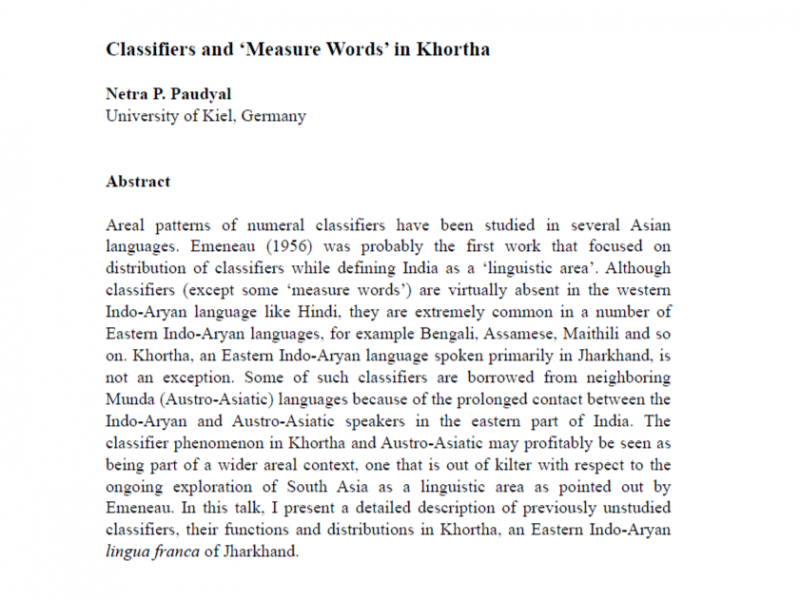Kosmos
Premiera polsko-japońskiego spektaklu na podstawie powieści Witolda Gombrowicza w reżyserii Hiroshiego Koike, 17 lutego, 19.00.
Centrum Sztuk Performatywnych Piekarnia, ul. Księcia Witolda 62–70. Wrocław
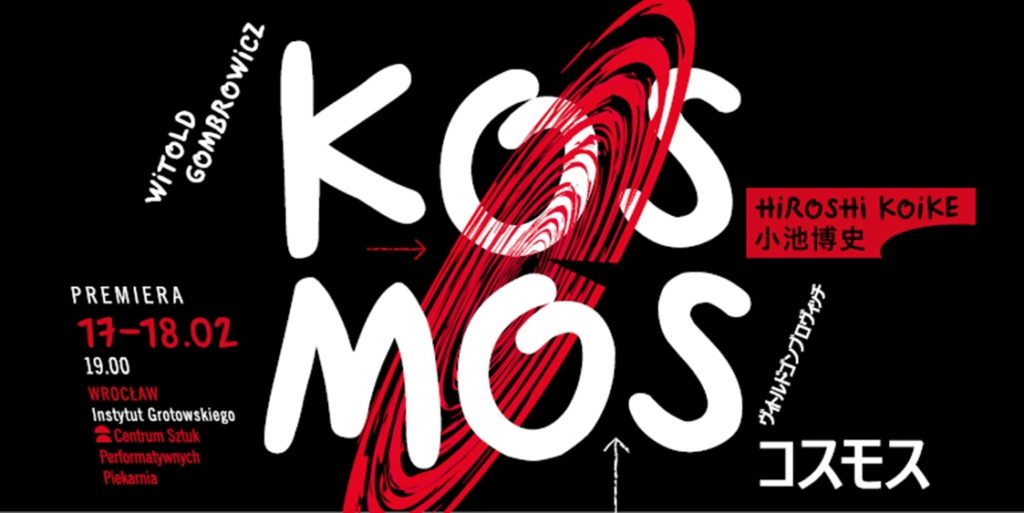
Premiera polsko-japońskiego spektaklu na podstawie powieści Witolda Gombrowicza w reżyserii Hiroshiego Koike, 17 lutego, 19.00.
Centrum Sztuk Performatywnych Piekarnia, ul. Księcia Witolda 62–70. Wrocław

Wykład odbędzie się on-line na platformie Teams Instytutu Orientalistyki UAM – link do spotkania: https://teams.microsoft.com/l/meetup-join/19%3a3f0cee4bbe7e44719ba92665b5df4a68%40thread.tacv2/1676989846041?context=%7b%22Tid%22%3a%2273689ee1-b42f-4e25-a5f6-66d1f29bc092%22%2c%22Oid%22%3a%22d3583398-bc5b-4d6b-b3f6-08c1e570e9d8%22%7d
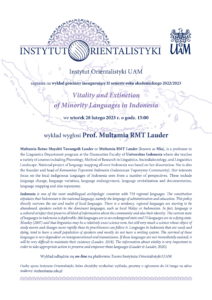
We at Institute of Oriental Studies, Adam Mickiewicz University in Poznań express our deepest sympathy and sincerest condolences to the peoples of Turkey and Syria over the loss of life and large-scale destruction wrought by the recent earthquake.
Our thoughts are with all of you at this difficult time!
Jako społeczność Instytutu Orientalistyki UAM składamy najgłębsze wyrazy współczucia i najszczersze kondolencje narodom Turcji i Syrii z powodu ofiar śmiertelnych i ogromnych zniszczeń spowodowanych przez katastrofalne trzęsienie ziemi.
Poznań Adam Mickiewicz Üniversitesi Doğu Araştırmaları Enstitüsü olarak, son depremin yol açtığı can kaybı ve büyük çaplı yıkım nedeniyle Türkiye ve Suriye halklarına en derin dostluğumuzu ve en içten başsağlığı diliyoruz.
Kalbimiz bu zor zamanda hepinizle birlikte!

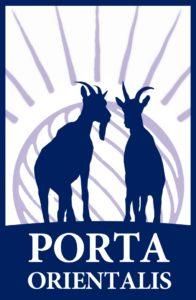
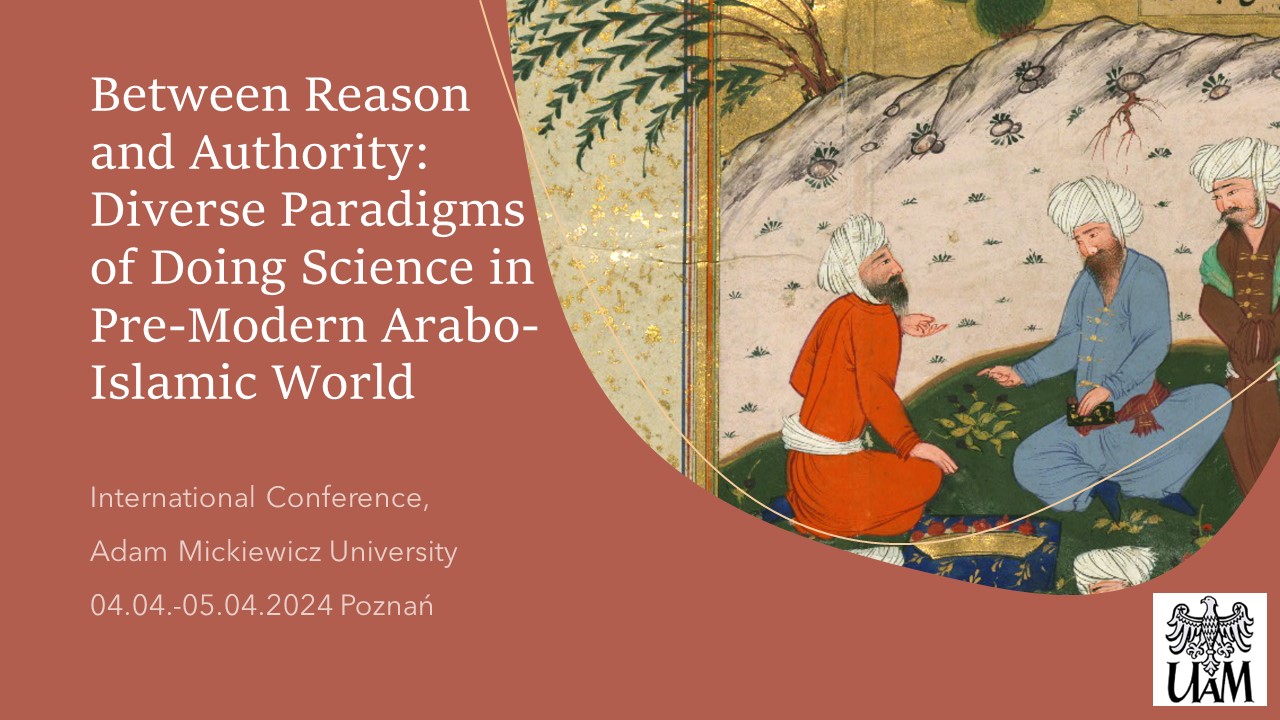
Zakład Arabistyki i Islamistyki przygotowuje konferencję:
Between Reason and Authority. Diverse Paradigms of Doing Science in Pre-Modern Arabo-Islamic World
Adam Mickiewicz University, Poznań, 2024 April 4th-5th
CALL FOR PAPERS:
Like all the major Monotheistic religions Islam had to deal with fundamental epistemological dichotomy between the divine revelation and human reason. The various schools of discursive theology (kalām) like Mu’tazilites and Ash’arites as well as Hanbalites/Muhaddiṯūn proposed their ways to solve the dilemma by different waging the status and usage of both principles. The issue was also of major importance for the Islamicate philosophers (falāsifa) who in later time struggled for legitimacy to think independently in more and more scripturally oriented milieu. This dichotomy influenced also the ideas of classification of knowledge considered by many thinkers, most notably by Ibn Khaldun (1332-1408), who divided the sciences into “transmitted” (‘ulūm naqliyya) and “intellectual” (‘ulūm ‘aqliyya). The first branch encompasses knowledge transmitted from the trustworthy authority – be it divine (like in the case of Qur’anic revelation), prophetical (like in the case of sunnah and jurisprudence) or ancestorial (like in the case of history, language, literature and rhetoric) – and depends on the chain of transmitters (isnad) as a measure of veracity. On the other hand the second branch includes philosophy: logic, physics and metaphysics; as well as natural (medicine and agriculture) and mathematical sciences such arithmetic, geometry, astronomy, music and the occult. These fields of inquiry are to be based on individual reasoning and verifiable by means of syllogism.
During the conference we hope to investigate both epistemological principles as well as theoretical foundations of the sciences based on them, their interrelations and different approaches of historical thinkers to questions such as: what is the hierarchy of sciences, are they opposed to each other, how to reconcile them, are their subjects different, where they do cross over. Various classifications of knowledge and educational strategies and practices are also the object of our interest. Another scope of interest will be the achievements of Islamicate intellectual sciences and their impact on European Medieval and Early-Modern scientifical development.
The year 2024 marks 750 solar years anniversary of passing of Nāsir al-Dīn al-Tuṣī (1201-1274), a polymath engaged in developing multiple fields from both transmitted and intellectual sciences. Writing both in Arabic as well as in Persian he left a collection of over 150 works. From Shi’ite theology to Ethics to mathematics and astronomy, to name just a few fields of his interest, he left a durable mark on many of them. He invented so called “Tusi-couple” that might have indirectly influenced astronomical models of Nicolaus Copernicus (1473-1543). The papers concerning aspects of al-Tusi’s work will be equally welcomed.
Please consider: We kindly ask all the participants to write their abstracts and held their speeches in English. The possibility to hold the speech in Arabic or Polish will be offered only in case of acceptance by other participants of the panel in question. Each speech should last for max. 20 minutes.
Scientific Board:
John Walbridge, key-note speaker (Indiana University)
Katarzyna Pachniak, key-note speaker (University of Warsaw)
Andreas Eckart (University of Cologne)
Emmanuel Pisani (Dominican Institute for Oriental Studies, Cairo)
Marcin Michalski (UAM)
Krzysztof Stroński, Dean of Faculty of Modern Languages and Literatures (UAM)
Tomasz Wicherkiewicz, Vice-director of Institute of Oriental Studies [for scientific issues] (UAM)
Organisational Comitee:
Łukasz Piątak, Secretary of the conference
Filip Jakubowski
Jamila Oueslati
Marcin Styszyński
Sylwia Hamodi-Owczarczak
Uniwersytet w Uppsali (Szwecja) i Uniwersytet Johannesa Gutenberga w Moguncji (Niemcy) ogłaszają program studiów magisterskich z turkologii na rok akademicki 2023/2024.
Program studiów obejmuje językoznawstwo, filologię i literaturoznawstwo oraz uwzględnia zarówno diachroniczne, jak i synchroniczne zagadnienia turkologii. Językiem nauczania jest angielski. Wymagana jest dobra znajomość języka tureckiego lub innego języka turkijskiego. Kandydaci muszą posiadać tytuł licencjata w dziedzinie turkologii lub dziedziny pokrewnej.
Studenci kończą dwa semestry na UU (pierwszy rok) i dwa semestry na JGU (drugi rok). Pracę magisterską prowadzą wspólnie pracownicy naukowi UU i JGU. Po pomyślnym ukończeniu programu absolwenci otrzymają dwa dyplomy magisterskie, jeden wydany przez UU, a drugi przez JGU („Double Degree”).
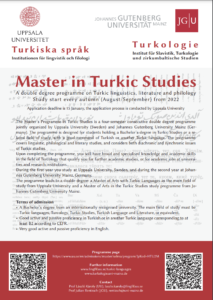
Z przyjemnością informujemy, iż ukazała się właśnie najnowsza książka prof. Izabelli Łabędzkiej pt. – Zatańczyć niewidzialne. Tajwański Teatr Tańca Brama Chmur 1973–2019.
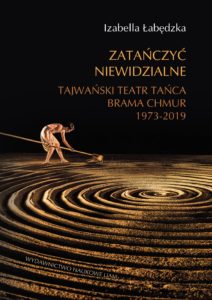
Książka jest kolejnym tomem monograficznego opracowania poświęconego tajwańskiemu teatrowi tańca. Praca stanowi rezultat wieloletnich studiów prowadzonych przez badaczkę w tajwańskich i europejskich bibliotekach, ośrodkach naukowych i teatralnych archiwach dzięki wsparciu Narodowego Centrum Nauki (Polska), DAAD (Niemcy), National Central Library i Chiang Ching-Kuo Foundation (Tajwan). Tym razem autorka bada niemal pięćdziesięcioletnie dzieje i metamorfozy jednego z najsłynniejszych zespołów tańca na Tajwanie ̶ Teatru Tańca Brama Chmur (Yunmen Wuji / Cloud Gate Dance Theatre). Dokonuje mistrzowskich analiz najważniejszych choreografii twórcy tego zespołu, Lin Huaimina, sytuując badane dzieła w szerokim kontekście kulturowym, filozoficznym, estetycznym. Ukazuje, w jaki sposób sztuka tańca może uczestniczyć w dyskursie społecznym, a nawet politycznym oraz przyczyniać się do kształtowania odrębnej, tajwańskiej tożsamości kulturowej. Autorka z komparatystycznym zacięciem przedstawia przemiany estetyki zespołu w ciągu dziesięcioleci, w odniesieniu do tańca współczesnego na Zachodzie oraz uwzględniając oddziaływanie na taniec innych sztuk i nowoczesnych technologii. Pokazuje mądrość łączenia elementów lokalnej tradycji i nowych tendencji w sztuce, dzięki czemu powstają inspirujące estetycznie i intelektualnie kompozycje taneczne. Dodatkowym walorem książki są piękne fotografie autorstwa tajwańskich fotografów, dokumentujące wybitne dzieła Lin Huaimina i tancerzy jego zespołu.
Najnowszy raport Uniwersytet Zaangażowany 2022 prezentuje inicjatywy i działania społeczności UAM, które są odpowiedzią na najważniejsze współczesne wyzwania i były/są realizowane we współpracy z instytucjami i organizacjami z otoczenia społeczno-gospodarczego uczelni.
Na str.24-25 mowa o działaniach i badaniach prof. UAM dra hab. Tomasza Wicherkiewicza.
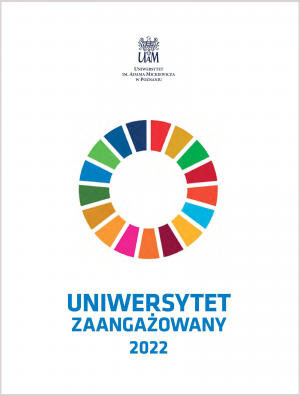
https://amu.edu.pl/__data/assets/pdf_file/0022/406147/Uniwersytet-Zaangazowany-2022.pdf
We cordially invite you to participate in a lecture:
